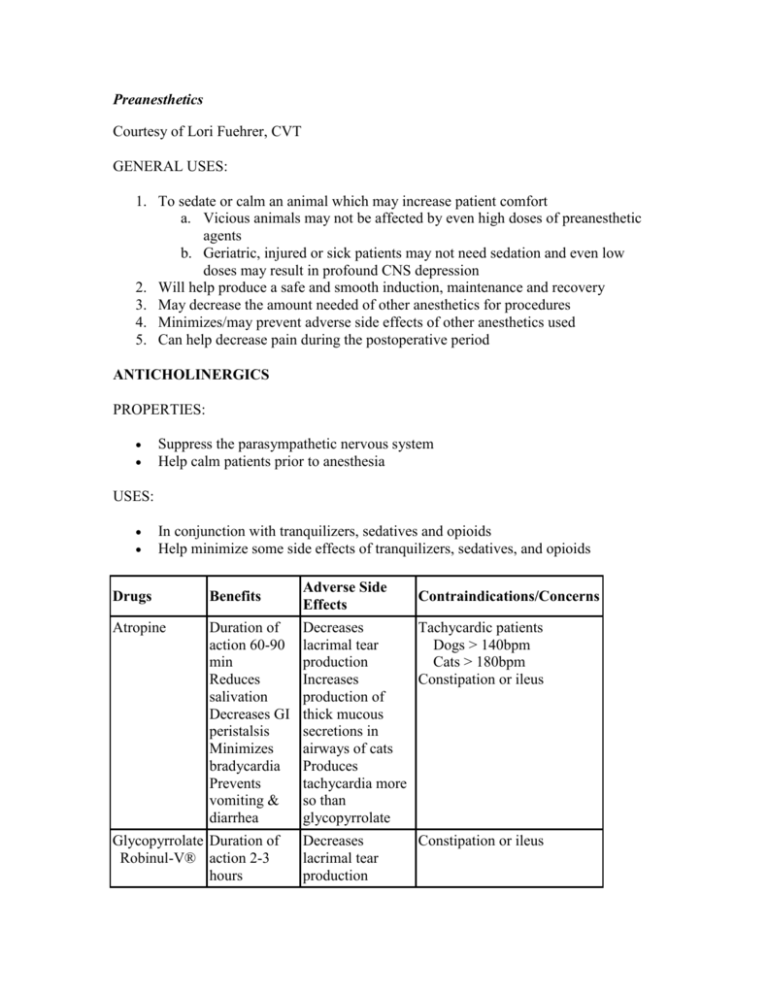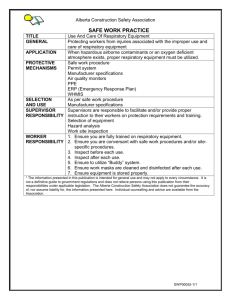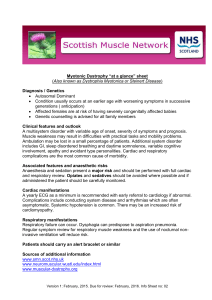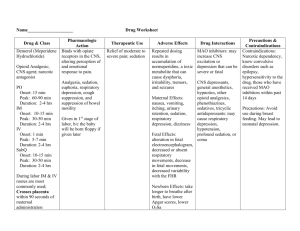Preanesthetics
advertisement

Preanesthetics Courtesy of Lori Fuehrer, CVT GENERAL USES: 1. To sedate or calm an animal which may increase patient comfort a. Vicious animals may not be affected by even high doses of preanesthetic agents b. Geriatric, injured or sick patients may not need sedation and even low doses may result in profound CNS depression 2. Will help produce a safe and smooth induction, maintenance and recovery 3. May decrease the amount needed of other anesthetics for procedures 4. Minimizes/may prevent adverse side effects of other anesthetics used 5. Can help decrease pain during the postoperative period ANTICHOLINERGICS PROPERTIES: Suppress the parasympathetic nervous system Help calm patients prior to anesthesia USES: In conjunction with tranquilizers, sedatives and opioids Help minimize some side effects of tranquilizers, sedatives, and opioids Drugs Benefits Adverse Side Effects Atropine Duration of action 60-90 min Reduces salivation Decreases GI peristalsis Minimizes bradycardia Prevents vomiting & diarrhea Decreases Tachycardic patients lacrimal tear Dogs > 140bpm production Cats > 180bpm Increases Constipation or ileus production of thick mucous secretions in airways of cats Produces tachycardia more so than glycopyrrolate Glycopyrrolate Duration of Robinul-V® action 2-3 hours Decreases lacrimal tear production Contraindications/Concerns Constipation or ileus Decreases salivation more effectively than atropine Decreases GI peristalsis Minimizes bradycardia Prevents vomiting and diarrhea Tachycardia produced is not as drastic as with atropine TRANQUILIZERS AND SEDATIVES PROPERTIES: To sedate patients by depressing the central nervous system Decreases apprehension and produces muscle relaxation o Results in safer and smoother induction, maintenance, and recovery of general anesthesia May also decrease amount of anesthetic agents needed to produce sedation, analgesia and general anesthesia. USES: Decreases apprehension and produces muscle relaxation Adverse Side Effects Acepromazine Antiemetic effect Hypotension Antidysrhythmic Hypothermia effect Decreases Antihistamine seizure effect threshold Drugs Diazepam Valium® Benefits Prevent intraoperative and postoperative seizures Minimal effects, good for geriatrics, pediatrics and Contraindications/Concerns Head trauma Procedures of spinal cord and brain Seizure history Liver dysfunction Shock Geriatrics and neonates May cause Cesarean section excitement, Neonates especially in Liver dysfunction cats Irritating to tissues Fast IV bolus may cause neurological problems cardiac arrhythmias Midazolam Minimal cardiovascular effects Will only produce sedation in debilitated patients Transient Liver dysfunction respiratory Respiratory disease depression Excitement in cats Minimal sedation as a sole agent except for debilitated patients Xylazine Rompun® Anased® Significant muscle relaxation Induce vomiting in unfasted patients Short acting analgesic 1520min Bradycardia Second degree heart block Respiratory depression in some Transient hypertension, followed by hypotension Abdominal distension Cardiovascular disease Respiratory disease Liver disease Renal disease Geriatric, neonates, and debilitated patients Pregnant animals Dogs prone to bloating Medetomidine Significant Domitor® muscle relaxation Short acting analgesic 2030min Adverse side effects may be less than those of xylazine Bradycardia Second degree heart block Respiratory depression in some Transient hypertension, followed by hypotension Abdominal distension Spontaneous muscle twitching Cardiovascular disease Respiratory disease Liver disease Renal disease Geriatric, neonates and debilitated patients Pregnant animals Dogs prone to bloating OPIOIDS PROPERTIES: Can be used as preanesthetics, induction agents, and analgesics Most effective analgesics Pain can be more easily controlled postoperatively when used as a preanesthetic Provides sedation and may decrease the amount of general anesthesia needed Can also be reversed with Naloxone USES: Produce pre-emptive analgesia when used as a preanesthetic Adverse Side Effects Contraindications/Concerns Bradycardia Respiratory depression Hypotension Euphoria & dysphoria vocalization in some dogs Respiratory disease Head trauma Spinal cord injury Shock Chest injury Bradycardia Respiratory depression Euphoria & dysphoria May produce excitement in cats when administered IV Respiratory disease Head trauma Spinal cord injury Shock Chest injury Butorphanol Provides Torbugesic® analgesia & sedation Less bradycardia and hypotension Mild respiratory depression Euphoria & dysphoria Analgesic effects only 1-2 hours, (less in cats) Respiratory disease Head trauma Spinal cord injury Shock Chest injury Meperidine Analgesic effects very weak Euphoria & dysphoria Respiratory disease Head trauma Spinal cord injury Shock Chest injury Severe respiratory depression that Respiratory disease Head trauma Spinal cord injury Drugs Benefits Morphine Provides analgesia & sedation Induces vomiting in unfasted patients Oxymorphone Provides analgesia & sedation Does not produce hypotension as much as morphine Produces sedation Less respiratory depression Buprenorphine Produces Buprenex® sedation Long lasting analgesic 8-12 may be hard to hours correct with a reversal agent Shock Chest injury PREANESTHETIC DRUG DOSAGE CHART Drug Canine Dosage (mg/kg) Feline Dosage (mg/kg) Acepromazine 0.03-0.05mg SQ or IM 0.1-0.2mg IV Maximum dosage 3mg ORAL 1-3mg 0.1mg SQ or IM 1.1-2.2mg IV Maximum dosage 3mg ORAL 1-3mg Atropine 0.02-0.04mg SQ, IM, IV 0.02-0.04mg SQ, IM, IV Butorphanol Torbugesic® 0.1-0.5mg SQ or IM 0.05mg IV 0.1-0.5mg SQ or IM 0.05mg IV Diazepam Valium® 0.2-0.4mg IM 0.1-0.5mg IV Maximum dosage 10mg 0.2-0.4mg IM 0.1-0.5mg IV Maximum dosage 10mg Glycopyrrolate Robinul-V® 0.01-0.02mg SQ or IM 0.01-0.02mg SQ or IM Meperidine 3- 5mg IM 5mg IM Morphine 0.25-1.0mg SQ or IM 0.1-0.3mg SQ or IM *May produce excitement Midazolam Versed® 0.2mg IM or IV Maximum dosage 10mg Not recommended as sole agent Oxymorphone 0.1-0.3mg IM 0.05-0.1mg IV Maximum dosage 3mg 0.1-0.3mg IM 0.02mg IV Maximum dosage 1mg Xylazine 1-2mg IM 0.2-0.5mg IV 1-2mg IM 0.2-0.5mg IV Medetomidine Domitor® 20-40 mcg/kg IM 10-20mcg/kg IV Micro dose 5mcg/kg IV 40-80mcg/kg IM 1-10mcg/kg IV Buprenorphine Buprenex® 0.01-0.015mg IM or IV 0.01-0.015mg IM or IV Courtesy of Lori Fuehrer, CVT





